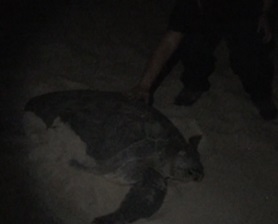 Ben & Waqiu had a great
experience when they went for the beach patrol, looking out for turtles that
come on shore to lay eggs. They described the night as the most memorable one,
with ‘Pak Ali’ a ranger who works for WWF (The World Wide Fund for Nature) to preserve
turtle eggs, preventing these creatures from extinction. The objective of beach
patrols is to prevent poachers from taking the eggs and selling them for
profits. Having such patrols will allow those who are on duty to transfer the
eggs to a hatchery where the eggs will be guarded by WWF personnel on duty. Regardless
of where the turtles laid their eggs, they will be placed safely to be hatch so
as to ensure higher rate of survival
Ben & Waqiu had a great
experience when they went for the beach patrol, looking out for turtles that
come on shore to lay eggs. They described the night as the most memorable one,
with ‘Pak Ali’ a ranger who works for WWF (The World Wide Fund for Nature) to preserve
turtle eggs, preventing these creatures from extinction. The objective of beach
patrols is to prevent poachers from taking the eggs and selling them for
profits. Having such patrols will allow those who are on duty to transfer the
eggs to a hatchery where the eggs will be guarded by WWF personnel on duty. Regardless
of where the turtles laid their eggs, they will be placed safely to be hatch so
as to ensure higher rate of survival
Before departing, they were told
to wear dark colored clothing to prevent frightening the turtles away as the
bright colors are easily mistaken as predators and danger. They were also
warned not to make too much noise or shine light unnecessarily while walking.
Just before they begin their patrolling duty, they released 70 hatchlings into
the sea with the presence of a marine biologist, Nurol who is a researcher
working with WWF. Then after, these two rover scouts walked with Pak Ali for
about 2.5km along the beach to spot for turtles coming on shore. They
encountered 5 turtles while they were about 2km into walking. Out of these 5
turtles, only 3 successfully found a safe spot to lay their eggs. This happened
at around 11.35pm. They waited about 2 hours for the turtles to find a good
place and lay their eggs. While waiting, they stayed about 10 meters away from
the turtles to prevent from scaring them away.
Indeed it was really a rare
opportunity to see 5 turtles at a go. This wasn’t the first time for Pak Ali to
encounter such situations with any volunteers like Ben and Waqiu.
However, Pak Ali was surprised because the egg laying season for the turtles was
ending soon. Least to say, these turtles came up in unison. They mentioned that
the turtles were about 50 meters apart from each other and that the turtles would
come up about every 15 minutes apart. One of the possible reasons could be that
the subsequent turtles noticed the first turtle successfully made the trip up
to shore to lay the eggs and followed too.

There were 2 species among these 3 turtles. They are the Olive Ridley and Green Turtle. Olive Ridley turtles laid a total of 233 eggs – 1st turtle (105), 2nd turtle (128) – while the green turtle laid 90 eggs. They were also told that the eggs can only survive 2 hours without being fully buried in the sand. Therefore, as soon as they collected the eggs and counted them, the eggs were transferred into pails and bags containing sand and brought to the hatchery site at Penarik Inn Beach Chalet, where there would be WWF personal on guard. Necessary data for research purposes is also collected from the eggs.
While heading back, they spotted a group of young men sitting by the
shore waiting for turtles too. It was no surprise to Ben and Waqiu because they
knew there will be poachers collecting the eggs for sales.







No comments:
Post a Comment